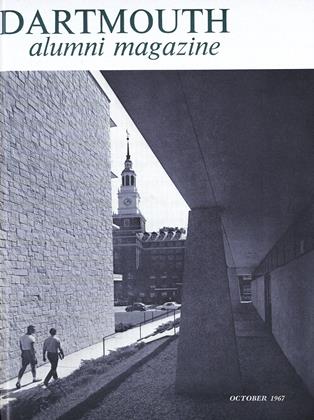Author of a volume of four long essays on the philosophy of perception entitled Philosophy, Science, and Sense of Perception, Maurice Mandelbaum '29 has now edited with Edward N. Lee another volume of essays, Phenomenology and Existentialism, published by the Johns Hopkins Press for $8. It attempts to provide a moderately advanced introduction to two important movements in modern philosophy. In a basically historical approach, essays focussing on key figures and their central thought include Brentano, Husserl, Heidegger, Sartre, and Merleau-Ponty. Contributors endeavor to show the relation between these philosophical movements and (1) the dialectics of Hegel and Marx, (2) Wittenstein's method of linguistic analysis, (3) psychology and psychoanalysis, and (4) the "alienation of man." The essays are an outgrowth of a week-long exploratory seminar at Johns Hopkins which provided lively and enlightening sessions.
A little book of only 156 pages, costing only $1.45, written by Robert A. Farmer '60 and published by Arc Books, Inc., New York, 1000 Ideas for English Term Papers, should prove as much a boon to high-school teachers and college professors as to harassed student searchers for a topic. The guide is divided into two sections: a short guide to the art of term-paper writing (research sources, organization and development, fundamentals of form, style, and tips) and topics ranging from Chaucer to Jack Kerouac and beat novels. Greek, Latin, German, French, Russian, and Italian authors and subjects are also included. Three samples: The Evolution of the Pun in Pope, Johnson, and Sterne; War and Literature in Remarque, Mailer, Rupert Brooke, Jean Anouilh, and Aristophanes; and Poetical Balance in "The Fury of Aerial Bombardment" by Richard Eberhart '26.
Northern Rails, A Complete Guide tothe Railroads of Maine, New Hampshire,Vermont, a large-sized booklet of 26 pages written and published by Dwight A. Smith Jr. '47 for $2, should provide all that a complete railroad buff could possibly wish to know about trains in the three states. Two large scale maps, capsule descriptions of large and small railroads, 26 photographs, locomotive rosters, freight schedules, gazetteers and directories of clubs, statistics on steam locomotives and passenger trains are well organized in 12 chapters, terse and factual.
In Descartes, a Collection of Critical Essays, edited by Willis Doney, Professor of Philosophy at Dartmouth, one gets a lot for $1.45 in the Doubleday Anchor Original, conveniently shaped for a man's jacket pocket. The 16 essays not only discuss important aspects of Descartes' "first philosophy" but also make original contributions to contemporary philosophical literature. Interest in the theory of knowledge has led British and American philosophers to reexamine Descartes' views in the light of recent developments. The bibliography of 20 pages gives invaluable information about standard editions, English translations, some books in French since 1945, books in English, articles since 1960 in English, the Cogito, the truth of clear and distinct perceptions and the charge of circularity, arguments for the existence of God sustance (mind and body), clear and distinct ideas and method, extended substance and physics, comparisons, and general and particular essays on Descartes.
James C. Risk '37, editor of The Numismatic Review, is author of "The Wembly Penny of Alfred the Great" in Vol. VIII, Number 2, 1967 of that magazine. The coins, created in 1924 by the Royal Mint for the British Empire Exposition held at Wembley outside London, were considered very satisfying reproductions of those used by Alfred who died in 889. Mr. Risk found one in a junk box and studied it with the help of Doran Jones, unofficial adviser to the Dartmouth College numismatic collections, who located in Baker Library an important news story about it in The LondonIllustrated News of June 14, 1924.
Robert E. Asher '31 of the Brookings Institution is the author of International Development and the U. S. National Interest published July 1967 as Planning Pamphlet No. 124 (price $1.00) of the National Planning Association of Washington, D. C. Mr. Asher, whose earlier writings have also explored the subject of U. S. economic assistance to developing nations, in this pamphlet examines the humanitarian, security, economic, and political rationales of such aid, and also writes briefly about the record to date and some of the reasons for current criticism. In his summary, he writes: "For the foreseeable future, the United States, like many other aid-giving countries, will have political and security interests, regional loyalties, historic and cultural ties, and ideas of its own with respect to the promotion of development, that will keep bilateral aid alive and important."
 View Full Issue
View Full Issue
More From This Issue
-
 Feature
FeatureMore Dividends Than Expected
October 1967 By MARION BLYTH -
 Feature
FeatureThird Century Fund Leaders ...
October 1967 -
 Feature
FeatureHalsey Charles Edgerton '06
October 1967 -
 Feature
Feature$51 Million Goal of Third Century
October 1967 -
 Article
ArticleThe Faculty
October 1967 -
 Article
ArticleWith the Big Green Teams
October 1967
Books
-
 Books
BooksShelf Life
Sept/Oct 2002 -
 Books
Books"The Law as a Vocation"
October 1919 By JAMES P. RICHARDSON -
 Books
BooksTHE ENJOYMENT OF MANAGEMENT.
MAY 1972 By JOHN HURD '21 -
 Books
BooksMATHEMATICS IN MEDICINE AND THE LIFE SCIENCES.
OCTOBER 1966 By JOHN PHILIP HENRY, M.D. -
 Books
BooksTHE STORY OF AMERICAN DISSENT.
November 1934 By Malcolm Keir -
 Books
BooksFROM WHENCE COMETH MY HELP
March 1940 By Roy B. Chamberlin


